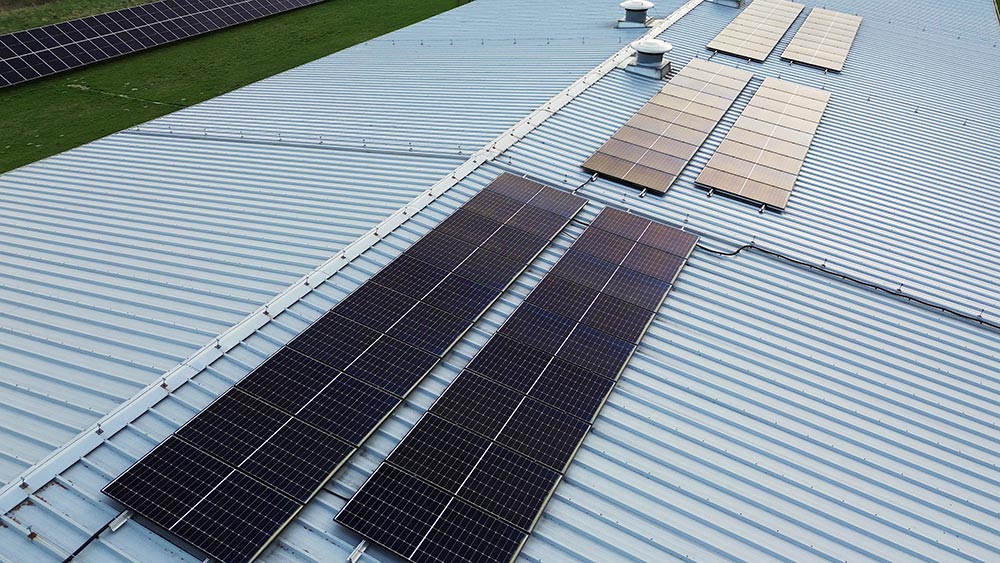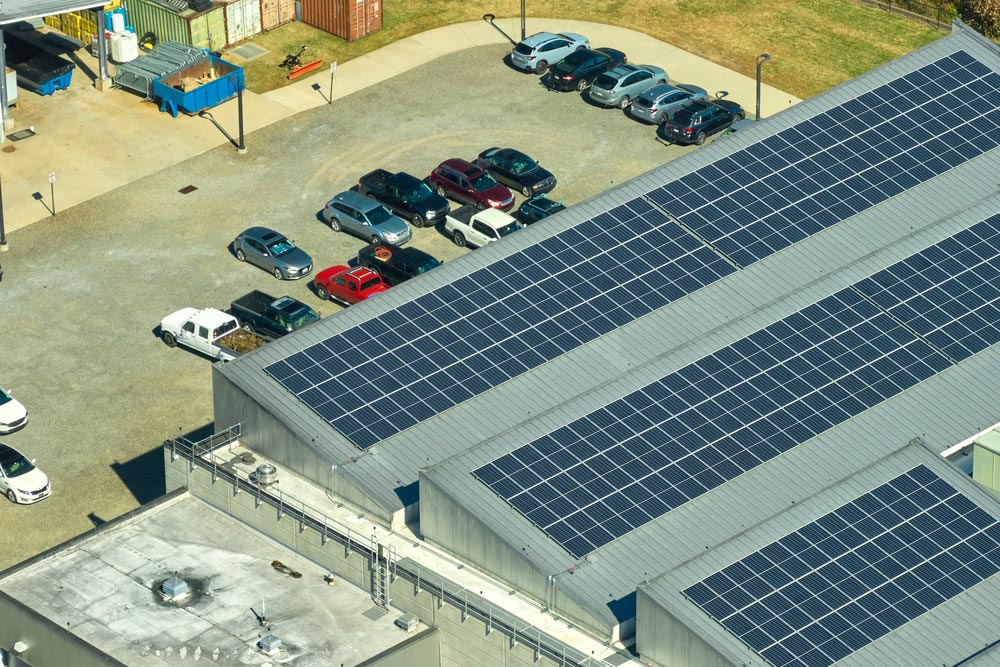Commercial solar energy systems can help businesses lower their electricity costs by a significant amount. They can also give businesses a hedge against increasing utility rates, which can be helpful in supporting long-term financial stability. Businesses that invest in commercial solar panels can take advantage of various federal tax incentives. This includes the Investment Tax Credit (ITC) and a number of accelerated depreciation benefits that can lower the net cost of installing commercial solar panels.

How Installing Commercial Solar Panels Reduce Operating Costs
Paying monthly utility bills can leave businesses with nothing to show for their investment. By installing commercial solar panels, they can move away from renting their electricity to owning a long-term energy asset. Whether they’re directly installed on your property or are generated off-site, solar energy will allow you to take control of your energy so you can stabilize your long-term cost.
Options for Installing Commercial Solar Panels
You have two options when it comes to installing commercial solar panels. You can either go into a Power Purchase Agreement (PPA), or you can purchase the system outright. You need to do a cost-benefit analysis so you can understand the potential savings, your return on investment (ROI), and the overall financial benefits of installing solar panels on your commercial building.
The Pros and Cons of a Power Purchase Agreement (PPA)
A PPA will allow you to lower your electricity rates without the upfront cost of buying a solar system. A third party owns and maintains the system while you purchase the power it generates (usually at lower rates than what’s offered by local utility companies).
PPAs will allow you to go solar without putting any money down. It will also allow you to avoid the responsibility of maintaining the system. But because you don’t own the solar panels, you won’t be able to claim the Investment Tax Credit (ITC) or any depreciation incentives.
The Pros and Cons of Purchasing a Commercial Solar System
Installing solar panels on your commercial building can be a game-changing investment, but you need to know about their advantages and disadvantages before moving forward. Here are some of the benefits of purchasing your own commercial solar system:
- Significant Cost Savings — They can lower your long-term operating costs by reducing or even eliminating your electricity bills.
- Environmental Sustainability — They can reduce your carbon footprint while supporting clean energy initiatives.
- Revenue Potential — They will allow you to generate additional income, because you can sell excess energy back to the grid where net metering is available.
- Positive Brand Image — They will allow you to improve public relations by showcasing your commitment to sustainability and innovation.
- Energy Independence — You’ll be able to protect your business from rising utility rates, which can improve your energy resilience.
- Eligibility for Incentives — You can access the 30% federal Investment Tax Credit and any accelerated depreciation benefits.
- Long-Term Financial Stability — They will allow you to lock in predictable energy costs for decades, which can make you more financially stable.
- Increased Property Value — Commercial buildings with solar panels usually have a higher market valuation.
Despite their advantages, commercial solar panels have the following drawbacks:
- High Upfront Costs — Purchasing commercial solar panels will require you to make a large capital investment.
- Sunlight Dependency — Solar panels are more suitable for areas that get a great deal of sunlight, so you won’t get as much output in cloudier climates.
- Space Requirements — You may need a large roof or land area for your solar system to meet energy demands.
- Aesthetic Concerns — Some businesses may be concerned about how their solar panels affect their building’s appearance.
- Maintenance Needs — While the requirements are minimal, they will still need regular maintenance. Eventually, the components will have to be replaced.
- Regulatory Complexities — Permitting, inspections, and utility interconnections can make the installation process harder and more time-consuming.
A number of studies have shown that solar power systems can increase the value of a home, so the same is probably true for commercial properties. Properties with solar panels are cheaper to maintain because the energy costs will be lower, but you must have solar panels on the commercial building to improve its property value.

Commercial Solar FAQ
Commercial solar panels are more common than you may think. Businesses of all sizes in many different industries are investing in commercial solar systems for their properties. A number of large corporations have installed solar panels in their places of operation, but many small and mid-sized businesses can benefit from the long-term cost savings.
Commercial solar can have a number of benefits. Some of them include the following:
– Reduced operating costs.
– Protection against inflation and rising electricity costs.
– A smaller carbon footprint.
– Enhanced brand equity.
– Blackout protection (with battery storage).
Be sure to speak to a professional for more information about how your business can benefit from a commercial solar panel installation.
The cost of a commercial solar system can vary widely, and it can depend on a number of factors (such as the size of the system and the types of products being used). Be sure to speak to a commercial solar power company for more information about the exact cost.
You will continue to get a statement from your utility company after you install your solar panels, which can cover all of your building’s electrical needs. But in most cases, they do not. Solar panels don’t work at night, and their output is reduced during the winter months when it’s cloudy. You will need to buy electricity from the grid during those times, and you will get a bill.
You can use net metering to buy electricity from the grid. You can also install battery storage, which will allow you to store solar energy that you can use when the panels aren’t producing enough. But even if your commercial solar system covers all your electricity, you will still get a monthly statement with your fixed customer charges.
Commercial solar panels can offset some or all of your electricity costs (depending on the number of solar panels you have installed and the amount of sunlight they receive). Be sure to speak to a qualified contractor for more information.
Utility rates can fluctuate according to the cost of natural gas and other fossil fuels, which are burned to generate electricity. But in the long run, commercial solar panels are more affordable than utility power because they don’t depend on volatile market conditions and rising electricity rates.
Commercial solar panel systems don’t require a great deal of maintenance, but they’re not maintenance-free. You should inspect your solar panels at least once a year to make sure everything is working properly, but some additional maintenance and storm damage repair may be necessary (depending on weather conditions).
Solar panels will constantly be exposed to the elements, so they can get covered by what’s circulating through outside air (such as pollen, dirt, and grime). This buildup can block the sun, which will reduce your output. Most of the time, natural rainfall will keep your solar panels clean. But for larger commercial systems, an occasional cleaning is recommended to make sure they’re getting the most output.
The timeline for a commercial solar panel installation will depend on a number of factors (such as system size, supply chains, local permitting processes, and utility requirements). Be sure to speak to a professional for more information about the specific installation requirements for your area.
Unless they’re connected to a battery, solar panels don’t provide backup power during a blackout. Solar batteries store any excess energy that your solar panels generate during the day, which can be used for backup power during an outage.
Aside from all their environmental advantages, solar panels have a number of financial benefits. So, a commercial solar panel system can be a lucrative investment for many businesses. There are programs and incentives that can help you pay for the system. They can also offset current operating costs and reduce future electricity rates.
If you’re looking for one of the best places to get commercial solar power in Corpus Christi, be sure to get in touch with Solar Power Integrator. We have a team of professionals with years of combined experience, and they would be more than happy to speak with you about your specific needs!
